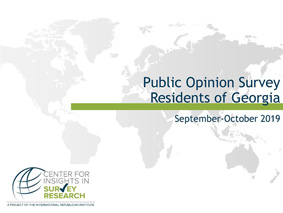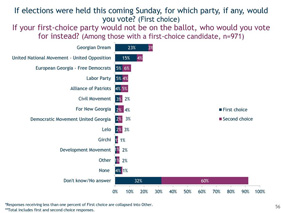
The IRI publishes the results of a public opinion poll
By Tsotne Pataraia
Wednesday, November 20
The US International Republican Institute (IRI) has published the results of a public opinion poll. The poll was conducted from September 11 to October 14, 2019, before the vote on constitutional amendments to the Parliament.
According to the ratings of the political parties, the ruling party is in the first place. Opposition parties are led by the “United National Movement”. If next week's elections were to take place, the ruling party would get the support 23 percent of the electorate and 41 percent would go to the opposition parties in total.
Q. Which party would you vote for if elections were to be held on Sunday? The results were as follows: “Georgian Dream” - 23%; “United National Movement (UNM)” - 15%; “European Georgia” - 5%; “Labor Party” - 5%; “Patriots Alliance” - 4%; “For New Georgia” - 2%; “Nino Burjanadze's United Georgia - Democratic Movement” - 2%; "Lelo" - 2%; “Girchi” - 1%; "Building movement" - 1%; Others - 1%; None - 4%; Don't know / refuse to answer - 32%.
Asked which party in the ruling coalition they would like to see if a coalition was needed to form a majority after the 2020 elections, the answers were as follows (respondents were allowed three answers): “European Georgia” - 28%; UNM - 25%; “Georgian Dream” - 24%; “Patriots Alliance” - 14%; “Democratic Movement” - 13%; “Labor Party” - 13%; “Lelo” - 12%; “Civil Movement” - 11%; “Building Movement” - 11%; “Girchi” - 4%.
According to the results of the opinion poll, 68% of the population surveyed in Georgia have heard about the proportional electoral system. 78% of them favor a fully proportional electoral system. 58% of the respondents believe that the transition to a fully-proportional system will have a positive impact on Georgia's democratic development.
According to the survey, the number of those who believe that the country is developing in the wrong direction has increased to 68%. Only 22% of the population thinks the country is moving in the right direction and 10% do not know it.
To the question, “I will read the names of Georgian politicians and public figures. Please tell me your opinion (positive, negative, I haven't heard, I don't know) about them, the most negative indicator in the answers given to the President of Georgia is Salome Zourabichvili. Zurabishvili positively evaluates 23% and 70% negatively. 57% disapprove of Bidzina Ivanishvili, the leader of the “Georgian Dream”, and 32% favorably. According to the results of the public opinion poll, the citizens are most favorable towards Davit Bakradze, the Chairman of “European Georgia”: 57% - positive, 36% - negative
The population was also asked about the country's foreign policy. 59% fully support Georgia's EU membership, 21% partially. A total of 10% are in whole or in part opposed to Georgia's EU membership (5% -5%), 10% have no or no answer. As for Georgia's accession to NATO, 51% of the population fully supports it and 20% partially supports it. 11% say they are absolutely against NATO membership, and 8% partially.
The International Republican Institute (IRI) also examined the sentiments of the population towards Russia. According to the survey, 48% fully supports the dialogue with Russia and 26% partially supports it. When asked how they rate the current government's relationship with Russia, 24% say it is very negative, 32% partially negative, 7% positive, and 27% partially positive.
To the question, "What should Georgia's foreign policy course be?", 27% responded that only pro-Western and 49% thought it should be pro-Western, though relations with Russia should be maintained. Only 2% say Georgia's foreign direction should be pro-Russian, while 12% think it should be pro-Russian, though relations with the European Union and the West should be maintained.
More than 52% of the population named the United States as the most important political partner for Georgia, and 50% - the EU. According to the same survey, 33% named the US as the most important economic partner, while the EU - 37%. According to the population, Russia is the biggest political and economic threat to the country. 83% think Russia is the biggest political threat and 72% think it is the biggest economic threat.
To the question, what are the three main challenges to Georgia's democratic development, 31% responded that unemployment, 28% - economic problems, 15% - wrong public policy, 12% - lost territories, 10% - education problems.
According to the survey, 36% of the population do not know or have no answer as to what the main achievement of the incumbent government is, and 21% say "nothing". 13% of the population cites health reform as the main achievement of the current government, and when asked what is the biggest failure of the government, 12% of the population cites failure to keep promises.
The Orthodox Church of Georgia is no longer first in the ranking of institutions. In April this figure was 89%, and the population was most positive about the work of it. Most of the respondents now have sympathies towards the activities of the army (86%).
The survey was conducted for the first time since the June 20 protests. IPM conducted fieldwork for the survey. A total of 1,500 people were interviewed nationwide. The margin of error does not exceed +/- 2.5 percent.
The survey was coordinated by Dr. Rasa Alisauskienne through face-to-face interviews with the IRI's “Center for Insights in Survey Research” at the respondents' homes through public and marketing research firm “Baltic Surveys / The Gallup Organization”. The study was funded by USAID. The survey involved 1500 permanent residents of Georgia aged 18 or older. The selection is representative by age, gender, region and settlement size of the general population. The response rate was 69 percent.


